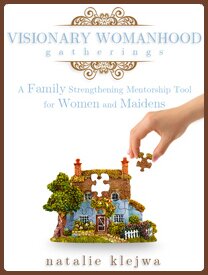Lessons from Deborah in Encouraging Male Leadership
By Contributing Writer Marci Ferrell

Deborah's Song by Gustave Doré
Deborah, the Prophetess from the book of Judges
Now Deborah, a prophetess, the wife of Lappidoth, was judging Israel at that time.
Judges 4:4
Deborah was a woman called by the Lord to judge Israel in a time of religious apostasy. She was a unique instrument of God who was used to give a direct revelation to Barak that Israel would defeat the mighty Caanites even though all odds were against them.
God sent a message to Barak, through Deborah, very clearly laying out that God would give Israel victory over the Canaanites. Barak was hesitant and insisted Deborah go with Him as God’s spokesperson for the Lord (Judges 4:8). Deborah did and predicted that the glory of the the battle would not go to Barak, but to a woman, due to his lack of trust in God (Judges 4:9, 5:24-27).
In some Christian circles Deborah is looked to as a model for women taking positions of spiritual leadership. We must remember that our theology cannot come from one story in the Bible, but we have to look at the whole of scripture.
Deborah’s story comes to us from the book of Judges at a time in Israel when there was no king and “everyone did what was right in their own eyes” (Judges 17:6). The fact that Deborah had a position of leadership and spiritual influence in the nation of Israel was a sign that the nation was deteriorating spiritually.
All throughout Scripture we see God’s distinct plan for men to be the leaders for God’s people. The heads of tribes were men, all the other judges were men, the inspired writers of scripture, kings, priests, the apostles were all men, and through these examples we learn much about God’s design for the role of men and women.
Women have a very important place in the work of the kingdom, and we are equal with men in terms of spiritual life, but not in terms of our roles and responsibilities.
Deborah is an example to us of how to promote male leadership and still keep herself in her subordinate role. She was clear that Barak was the designated leader and God had called and commanded him to lead Israel into battle – she did not seek a leadership role. (Judges 4:6-7, 14-16).
Encouraging Male Leadership by Deborah’s Example
Deborah played a role in helping Barak become the leader he was called to be. His faith was lacking, but Deborah’s faith was strong, and she encouraged him in his role. I would hope to be an encouragement to the men God has place in my life in their role as leaders. I need to be aware of when I can be nurturing and affirming leadership to the men in my life.
Am I praying for the men in my life? Do I give my husband the opportunity to take the lead by letting him make decisions and trust in them when he does? When he seeks my opinion do I share it and trust the final decision to be his and never to give an “I told you so” no matter what the outcome?
Deborah never tells Barak what to do; she simply communicates a message from the Lord (Judges 4:6). How can I learn to influence the men in my life without telling them what to do?
Deborah just speaks what God has put on her heart and does not give direct commands. How can I invite my husband to lead so that I can be the responder?
I want to draw out the best from my husband because as he continues to mature in his role it further enhances my role as a woman and when we are living out the roles God has called us to God gets the glory.
When Barak asked Deborah to go with him into the battle, she replied with “yes” – it was not her idea but his – Deborah was the responder in this situation. God used Deborah who was submissive to His call on her life to bring men into leadership and help them to fulfill the role God had called them to (Judges 5:2). The battle was won, and in Deborah and Barak’s victory song, all praise for the visctory was given to the Lord (Judges 5:10-11).
A Mother’s Heart
“In the days of Shamgar, son of Anath,
in the days of Jael, the highways were abandoned,
and travelers kept to the byways.
The villagers ceased in Israel;
they ceased to be until I arose;
I, Deborah, arose as a mother in Israel.
(Judges 5:6-7 ESV)
Deborah’s motivation was not in seeing herself as a judge or a prophet, but in this passage she refers to herself as a mother. The Bible doesn’t tell us if she had physical children, but God has given all women a mother’s heart to nurture, protect and show compassion to those around us.
May we learn from Deborah how to have a shepherding mother’s heart, that we would delight in being women and have hearts that are submissive to the authority God has put over us. May we be women who strengthen and encourage the men in our culture today to be leaders and to take a stand for truth.
May we be women of prayer and instead of taking control assert our influence by the power of prayer in seeking to ask God for help and guidance when battles arise in our lives.





















Well said, Marci! This is so important, especially in today’s culture where men are being devalued. I really appreciated your words here, especially as I seek to raise 3 boys for His glory! Thank you and God Bless You!
Michelle
Wonderful post, Marci! So many times the example of Deborah is given to women for female leadreship, even in ministry positions of the church. Thank you for being truthful and straight and narrow on the issue of Deborah.
I’ve heard before that we can’t take Deborah out of the context of the whole Bible, which I certainly agree with. But here’s the thing in my mind: If God is genuinely opposed to female leadership, it seems to me that he wouldn’t call a woman to lead at all, ever. God will never ask us to do something that he has determined is wrong. God is opposed to child sacrifice, therefore he never, even when Israel is in the bottomless pit of sin, asks them to sacrifice their children as a “lesson” to them about how sinful they are. God never tells any of his people to commit adultery. God never tells any of his people to worship false gods. If female leadership is simply wrong, something that God is genuinely opposed to, then he would not have called Deborah to lead and judge Israel. He would not have blessed her leadership with victory and decades of peace. But he did. So something’s going on here. Is Deborah’s story unusual? Yes, absolutely. Does that automatically mean it sets no precedent for female leadership? I don’t think so. If nothing else, the story of Deborah seems to tell us that God is not opposed to female leadership, at least not absolutely.
God often allows things that He knows are not best for His people. He allowed polygamy. (Horrible things resulted from that) He allowed the Israelites to have a king when they begged and begged for one (and we all know where THAT got them)…and there are other examples. (God, amazingly, is able to work IN SPITE of our sin. Just think of what He would do if we would OBEY). But He also made it clear in each case that it was not HIS choice for them, and that they would suffer consequences for desiring their own selfish (and short sighted) methods rather than trusting Him and His awesome wisdom and love for them. His ways are always best. In the examples above, they got what they “wanted”, but they suffered. God brought “leaness to their souls”. They lost God..the far greater treasure… in the process. The point of the post is to show that females in leadership over men is a symptom of a greater problem: a nation (and a church) that has rejected God and His Ways. Sure…put women in leadership over men. We can do that. And it can look and feel really good for a while. Just don’t expect God to say, “Oh…that’s OK. It doesn’t matter what I say. I’ll make sure I bless ya’ll anyway!” ; ) He allows it. But to what purpose? Ultimately, we will reap the natural consequences. We already are in a million different ways.
Christina I appreciate your comment because I know it is on the mind of many women. Deborah never takes the role of a leader she is called a prophetess – she was given a word from the Lord. She uses her role to strengthen the men around her and glorify God. We must as believers keep it in context with passages such as 1 Timothy 2:11-14 and 1 Timothy 3:1-13 & Titus 1:6-9 where masculine pronouns are used to exclusively describe elders, pastors & deacons. This would be another post in itself but I have appreciated the quotes below and I encourage you to spend time reading the link at the end of the last post.
“Note that Deborah did not go out and publicly proclaim the word of the Lord. Instead, individuals came to her in private for a word from the Lord. The difference between Deborah’s prophetic ministry and that of male Old Testament prophets is clear. She did not exercise her ministry in a public forum as they did. Note that even when she speaks to Barak she calls him and speaks to him individually (Judges 4:6, 14)” (Recovering Biblical Manhood and Womanhood, p. 216).
“That Deborah is a prophetess means God sometimes speaks through her. By itself, this information does not tell us anything about her role in the nation or even about her character. God chooses whom he will, and usually we do not know why. Isaiah tells us that the rule of women is a sign of degeneracy, not liberation (Isa 3:12). Certainly the time of the judges is a dark time in Israel’s history. Those who seek to extrapolate doctrine or practice from Deborah need to remember that Judges 4-5 is the historical report of a very rare circumstance in a far-from-ideal setting.9 These chapters are given for our edification, but should not be seen as precedents or used to overturn clear commands of Scripture.” excerpt taken from:
http://www.cbmw.org/Journal/Vol-11-No-2/The-Womanliness-of-Deborah
Thanks for the replies and input. I take your point that God allows things that he doesn’t approve of (you give good examples), but I don’t see Deborah falling into that category. The judges in the book of Judges are clearly provided by God to deliver his people. They are a gift from God when the people deserve no good gifts. This is why the pattern is that the people sin, God gives them over to a foreign oppressor, the people cry out to God, and then we have the story of a judge he sends to help them, the judge has some kind of victory (big or small) and the people have some kind of peace (long or short). This pattern is clearly seen in Judges 1-16, and just as clearly seen in the specific story of Deborah (Judges 4-5). Because Deborah follows this pattern, I don’t see any indication in the text that God “allowed” but did not approve of Deborah’s judgeship. If the other judges are from God, then there seems no reason to think differently of Deborah.
In the same way, I don’t see anything in the text to indicate that Deborah’s judging was done in private. She sits under a tree in a well-known place and judges the questions and concerns of Israel. She sends for princes and warriors of Israel, and they obey her summons. I’m not sure how this is any different than someone like Solomon, who sat in Jerusalem. He was in a public place, people came to him to settle questions and concerns, he sent for people who came when he called, he gave them commands which they obeyed. Deborah’s doing the exact same thing. There’s nothing private about it. She’s the judge, everyone knows it, and everyone goes to her with their problems and concerned. She’s the seat of government and people come to her. It strikes me as an efficient way to govern, not a private way to govern.
So if God never calls us to do something he’s opposed to, and if he called Deborah to lead his people, then we can say that God is not necessarily opposed to female leadership. This may give us a vision for how to read the rest of Scripture?
Good, challenging thoughts, but I believe your first premise is wrong, making the entire argument moot. God DOES sometimes “call” humans to things He is opposed to. He appointed Saul to be king. He hardened Pharaoh’s heart. Lots of other surprising examples in the Bible. Throughout history He raises up wicked leaders to bring judgement on wicked nations. Does that mean He approves of wicked leaders? Likewise, though Deborah was used by God, it is plain from the rest of Scripture that this is not the “norm” for God’s people. She was an exception. We have a tendency to approach issues in a formulaic way, but God doesn’t always fit into our molds. I love the amazing mysteries of God!!
Wemmick Girl — can’t argue with your examples. However, it does seem as though Deborah is spoken of in the book as a gift from God. No condemnation is made in the text of her acting as judge of Israel. She is called a “mother of Israel” which seems a complimentary term. Her motherhood (guidance) of Israel is attributed with the time when the Lord came down to help his people. She “awakes” to sing to the Lord and all the princes of the land follow her. And her judgeship is blessed with victory over the Philistines (God’s and Israel’s enemies) and 40 years of peace, also a sign of God’s blessing. Both victory and peace are signs that God blessed a judge — you can see as the book goes on the judges have less and less success in these areas (see Samson, the last judge, who has little of either, at least in any permanent way. He is also the least godly of the judges.)
So again, it seems like Deborah is called by God and he is calling her to be a gift to her people, a blessing from God. This does make her example different than the hardening of Pharoah’s heart, the kingship of Saul or the use of foreign peoples to punish Israel.
You’re absolutely right. God put her in that position, and He used her to bless. I gave those examples of wicked folks being used by God to demonstrate that the first premise in your argument was fallacious. : ) Our argument here is that though Deborah was a righteous woman used by God, her role was not the norm in Scripture for a female, nor is it promoted or taught anywhere in Scripture as normative. In fact, there are many places in Scripture, both in overt teaching (see verses Marci wrote above) as well as by example, where the female role is different from the male role in the area of state/church leadership. We females have just as important a “place” in society, in church, etc. If we don’t fulfill our roles and responsibilities the way God designed it, societies suffer. Churches suffer. Families suffer. Yes, throughout history and in our day, men sin and don’t take the leadership. They are doing what WE are doing when THEY don’t take up their roles with purpose and godliness. And yes, women sometimes step in and take over. And yes, God uses women in those roles. But it isn’t His design. It isn’t ideal, and we are missing out on His greatest and best blessings because we are all muddled up over this whole thing. Personally, I believe that if Christian men would do their God-given “thing”…we women wouldn’t be HAVE to be having discussions like this. I have to go feed a baby now and then go to bed. Thank you for sharing your thoughts!! It’s been a good discussion.
I’m enjoying the conversation, too. This will be my last post since I’m sure no one’s reading these comments anymore except for me.
I agree with you – Deborah is an exception. I don’t think she’s as rare as you say, but she’s certainly an exception. So the question is, what does this exception mean? This is where we disagree, I think.
Genesis 1-2 describes the world as God intended for it to be. The Garden is a picture of what God wants for us and for the world. There is nothing in this text to indicate the subordination of women. Yes, Eve is made as a “helper” to Adam, but this word does not mean or imply subordination or one who is made to follow rather than lead. This word is used in the O.T. to describe Eve and God. God is Israel’s “helper”. We never assume this means he is subordinate to Israel or that he follows Israel’s lead. So the fact that Eve is considered Adam’s helper doesn’t indicate that she is subordinate to him, as far as I can see. It is only after the curses that Eve is told Adam will rule over her. In other words, the idea that women are somehow subordinate to men is part of the curse of sin. The ENTIRE rest of the Bible describes how God is working on our behalf to reverse these curses.
Deborah, and other like her (Esther, Huldah, Phoebe, Lydia, Priscilla), are a pattern of what God is working towards in order to overcome the curses. In a world that treated women like chattel, God chose women to lead! And he blessed their leadership! It was for their good and the good of their people! These women are a picture of God’s future for us – not a future dominated by women, but a future in which all God’s people serve him according to the gifts given by the Spirit, not, first and foremost, according to their sex.
Jesus came to overcome the curses and make all things new. Deborah and others are an exception that point to where God is going, not where he doesn’t want to go.
Well, this is getting beyond the scope of this post, and there is a lot that could be said here. Wish we could sit down and talk…that would be fun! I guess to sum up my thoughts on your point above:
1. I agree that in the garden, when the world was perfect and there was no sin, there likely would never have been an opportunity for Adam and Eve to butt heads over anything. And because of Jesus, God is working to reverse the curses. BUT…
2. Sin is a factor now. And because of sin, humans disagree. God “knows we are dust”…and His law is all LOVE toward us…giving us a blueprint for how to best thrive in a sinful world where everyone butts heads all the time.
3. In society, in order to make things “work”, there has to be such a thing as “authority”. You can even see it in the Godhead…Jesus is “obedient” to God the Father. In every facet of society, SOMEONE has to lead. That implies followers. If you have ALL leaders…things fall apart. Think of what would happen in the military if all the men were calling out orders and nobody was following them. When there is clear authority…along with obedient followers…things run smoothly.
4. The Bible is clear when it says, “Wives submit to your husbands.” (Eph. 5) No cryptic language there. So we see there and in other places the idea of one spouse being the “submissive” one. That word is ugly in our culture…but it isn’t an ugly word to God. So part of our problem is how we view that word. I don’t know for sure, but I wonder if maybe you tend to view it the way the world does. Submission = Bad. Women have to submit, therefore, women get the “bad” end of the stick. If we saw it the way God sees it, we might realize we get the BEST end of the stick…(God’s kingdom is upside down from ours…)
5. A husband and wife are supposed to be “one”…and hopefully will agree on most major issues. Sometimes when they disagree, a husband may choose to defer to his wife’s choice in a matter. But in some cases, when no compromise can be reached, God is clear that the partner who must defer is the wife. Why? We don’t know. He could have chosen the husband to defer to the wife. But He didn’t. This is a faith issue…we have to trust that He knows best…and we don’t need to know “why” like a bunch of little kids. Our job is to trust and obey. This takes self control, nobility, maturity, insight into the “unseen”, and patience to wait for God to reveal the mystery one day.
6. One other thought…Jesus was/is the King of the universe, yet He humbled Himself and came as a servant. A servant serves…gets “under” those he is serving. Jesus did that for us. It certainly didn’t make Him less of a King and us humans more amazing. Not by a long shot. By God’s economy, it made Him more amazing. When wives serve/submit/obey their husbands (and I’m not touching on the fact that it is much easier for wives to do that when husbands are doing THEIR part which is to love their wives), they are DOING WHAT JESUS DID. (I Pet. 2-3) What could be more of a privilege than that?
7. OK…I guess I had ONE MORE thought… : ) I think part of our problem is that in history, men HAVE abused this principle…and abused women as a result. That is abhorrent to God. God intended women to be treasured, loved, and honored…and that doesn’t happen very often. So women have risen up now and swung the pendulum in the opposite direction. But God ALSO intended men to be respected and followed. Both men and women rebel against God’s plan, and because of that, we’ve got a big mess and a LOT of confusion on our hands.
Anyway, those are my random thoughts late at night. : )
Oh, well, I guess someone else is reading! In that case, I’ll go again!
First, I don’t think my comment goes beyond the scope. The original post asked two questions: What does Deborah mean for us today? and, How can we understand her story in light of the whole Bible? I’m trying to deal with those two questions.
Second, I’m not at all opposed to wives submitting to their husbands, but I don’t think the husband/wife relationship is particularly relevant here. Deborah’s story is not the story of a wife’s relationship to her husband, it is the story of one woman acting as leader of God’s people. I only brought up the Adam/Eve relationship because Eve’s designation as “helper” is sometimes understood to mean that all women are assigned the role of follower in any situation that also involves men. I don’t think that’s what Genesis 1-2 is saying about women and men. In fact, Deborah is certainly acting as Israel’s “helper” in this story. So married or single, Deborah acts as a leader within the broader community, and there’s no indication that this is a violation of her marriage (if she has one).
Third, I’m also not at all opposed to the idea that we need and will have leaders, both in society and the church. All I said was that God is moving us to the understanding that a person’s service to Him and his people (whether as leaders or followers or both) will be determined by the Holy Spirit’s giftings, not by a person’s sex.